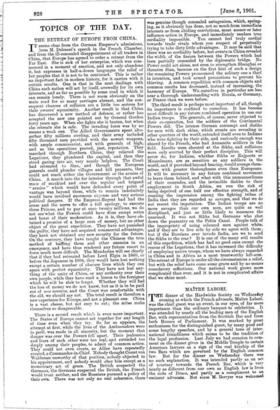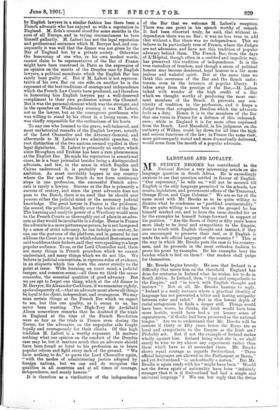MAITRE LABORI.
THE dinner of the Hardwicke Society on Wednesday evening at which the French advocate, Maitre Labor', was the chief guest was an event, in our eyes, of far more importance than the ordinary banquet to celebrities. It was attended by nearly all the leading men of the English Bar, with representatives from the Scottish Bar and from both Houses of Parliament. It was marked by great enthusiasm for the distinguished guest, by many good and some lengthy speeches, and by a general tone of inter- national friendliness which seems to be the tradition of the legal profession. Last July we had occasion to com- ment on the dinner given in the Middle Temple to certain American lawyers as a sign of the real kinship of the two Bars which are governed by the English common law. But for the dinner on Wednesday there was no such explanation. It was intended partly as an act of courtesy towards the French Bar, which is very nearly as different from our own as English law is from the code of Draco, and partly as a compliment to an eminent advocate. Not since M. Berryer was welcomed by English lawyers in a similar fashion has there been a French advocate who has enjoyed so wide a reputation in England. M. Zola's counsel stood for some months in the eyes of all Europe, and in trying circumstances he bore himself gallantly. M. Labori has not the legal reputation and professional eminence which M. Berryer had, and con- sequently it was well that the dinner was not given by the Bar of England but by a private society. Otherwise the honouring of one who, in his own modest words, cannot claim to be representative of the Bar of France might have been construed in Paris as the expression of an opinion on the merits of the Dreyfus case by English lawyers, a political manifesto which the English Bar has rarely been guilty of. But if K Labori is not represen- tative of his own Bar on one side, on another he is the exponent of the best traditions of courage and independence which the French Law Courts have produced, and therefore in honouring him English lawyers pay a well-deserved compliment to their own profession across the Channel. But it was the personal element which was the stronger, and in the speeches on 'Wednesday evening it was K Labori, not as the lawyer, but as the courageous gentleman who was willing to stand by his client in a losing cause, who was chiefly responsible for the enthusiasm of his hosts.
To any one who listened to the grave, well-balanced, and most unrhetorical remarks of the English lawyers, notably of the Lord Chancellor and the Attorney-General, and afterwards to M. Labori's two admirable speeches, the root distinction of the two nations seemed typified in their legal dignitaries. M. Labori is primarily an orator, which since Brougham and Erskine has been a rare phenomenon at the English Bar. He made his reputation in sensational cases, he is a busy joUrnalist besides being a distinguished advocate, and law, in the sense in which Sugden and Cairns understood it, is probably very far from his ambition. As must inevitably happen in any country where the Bar and the Bench do not form continuous steps in one profession, the successful French advo- cate is rarely a lawyer. Success at the Bar is primarily a success of oratory, and since the great advocate does not pass to the Bench, there is no need that he should ever possess either the judicial mind or the necessary judicial knowledge. The great lawyer in France is the professor, the savant, the publicist, hardly ever the leader of the Bar. The learning and analytic power of a Westbury would seem to the French Courts as thoroughly out of place in an advo- cate as they would be invaluable in a Judge. Hence in France the advocate is a more picturesque person, he is not hampered by a sense of strict relevancy, he can indulge in oratory, he can use the gestures of the platform, and in general he can address the Court in a way in which educated Bostonians are said to address their fathers, as if they were speaking to a large popular audience. To us, as the Lord Chancellor said, there are many things in French procedure which we cannot understand, and many things which we do not like. We believe in judicial conventions, in rigorous rules of evidence, in an etiquette which ties down the orator strictly: to the point at issue. Wide learning, an exact mind, a judicial temper, and common-sense,—all these we think the mum causantes, the essential qualities of good advocacy. But we are apt to forget one thing, which at the old dinner to M. Berryer, Sir Alexander Cockburn, if we remember rightly, spoke eloquently of,—that an advocate must above all things be loyal to his client, independent, and courageous. We may miss certain things at the French Bar which we expect to see, but this one quality, as it seems to us, has never been wanting. The High-Tory Sir Archibald Alison somewhere remarks that he doubted if the trials in England at the time of the French Revolution were so fair as the trials in France even during the Terror, for the advocates on the unpopular side fought loyally and courageously for their clients. Of this high tradition M. Labori is a worthy exponent. It matters nothing what our opinion on the conduct of the Dreyfus cam may be, but it matters much that an advocate should have been found so loyal to his profession as to brave popular odium and fight every inch of the ground. "We have nothing to do,' to quote the Lord Chancellor again, "with the modes of administering justice adopted by foreign nations, but we can and do recognise the qualifies in all countries and at all times of courage, independence, and manly honour."
It is therefore as a vindication of the independence of the Bar that we welcome K Labori's reception. There was one point in his speech worthy of remark It had been observed truly, he said, that without in- dependence there was no Bar; it was no less true to add that without a Bar there was no independence. This we believe to be particularly true of France, where the Judges are not advocates, and have not this tradition of popular advocacy behind them. The French Bar, from the days of L'HOpital, though often in a crabbed and impolitic way, has preserved this tradition of independence. It is the true custodian of freedom, and though a sense of political honour may become deadened, legal honour is a far more jealous and wakeful spirit. But at the Game time we think this severance of the Bar and the Bench unfor- tunate, even in the interests of popular liberty. It takes away from the prestige of the Bar,—M. Labori talked with wonder of the high credit of a Bar which we thought worthy of producing the most emi- nent members of the Bench. It prevents any con- tinuity of tradition in the profession, and it keeps a Judge from that sciupulous freedom which the advocate feels as a duty. Hence it is to the members of the Bar that one turns in France for a defence of this independ- ence; while in England it is far more often expressed from the Bench. Lord Mansfield, in his judgment on the outlawry of Wilkes, could lay down for all time the high and serious functions of the law; in France the same view, more picturesquely stated and more dramatically delivered, would come from the mouth of a popular advocate.







































 Previous page
Previous page